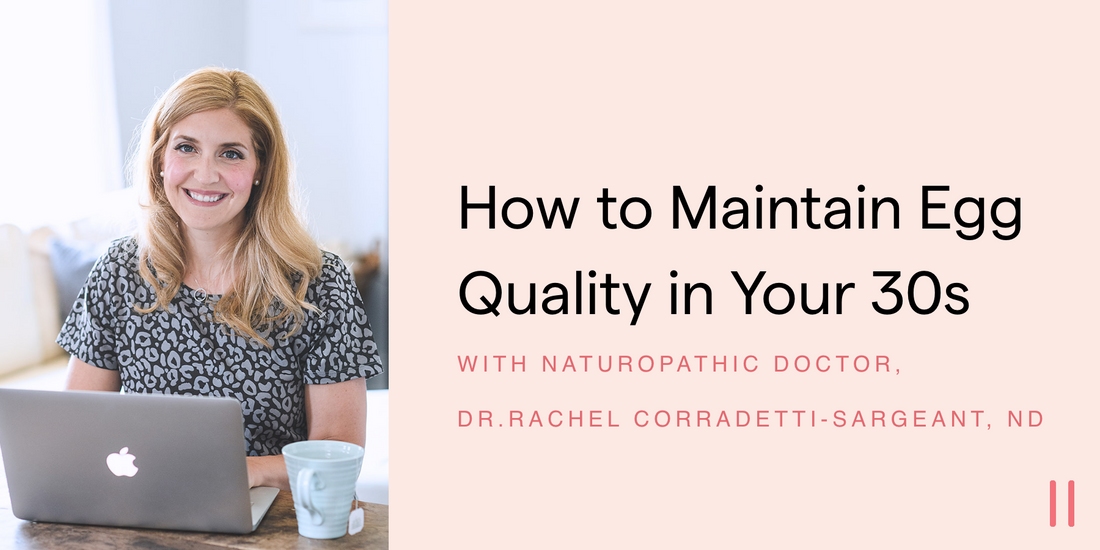Dr. Rachel Corradetti-Sargeant, ND is a fertility-focused Naturopathic Doctor practicing at Conceive Health at Niagara Fertility in Stoney Creek, Ontario, Canada. She works daily with patients looking to improve their preconception health to work toward conceiving and maintaining healthy pregnancies. She carried two children to term with the assistance of preconception healthcare. When she isn’t working with patients in the clinic she is making a mess in the kitchen, cycling, or contributing to articles in Elle, Clean Eating, and Oxygen magazine.
Egg quality is a hot topic in the fertility world. Why? Because we hear about it so often as a cause of infertility.
What is egg quality?
It speaks to the quality of the energy systems within the egg cell, or oocyte. Within each of our oocytes we have a cool, little organelle called a mitochondria. I like to think of the mitochondria as the cell’s engine. Kind of like the engine in your car, it creates the energy that the oocyte uses to grow and repair. When oocytes get older their mitochondria get older. This means the energy systems do not function as well and we have more room for error and damage. Again, I like to think of this as the engine of an older car. As the car ages so does the engine and over time that means the car won’t work as well.
Why is egg quality important?
When you’re trying to conceive we want to ensure your oocyte’s energy systems are top-notch so as not to interfere with the development of the egg during a menstrual cycle, as well as the development of the embryo when the egg and sperm meet.
Is there a way to test egg quality?
At this time we do not have any easy tests to understand egg quality. We can get an idea of how many eggs you have left by testing Anti-Mullerian Hormone (or AMH) and doing an ultrasound of your ovaries, but this test does not tell us about the quality of the eggs. There are tests being developed, like Violet™, which use AI technology to determine the quality of eggs, but this type of testing isn’t readily available. So for now we can only guess about quality from age, cycle monitoring, and how well patients do with artificial reproductive technology (ART) like IVF.
What can we do to improve egg quality?
Thankfully there are a few things that can be done to improve egg quality even in our early 30s. Here are a few things to think about:
-
Toxin Exposure: This is one of the most important elements of egg quality that we often don’t think about. However, it’s very important to think about toxin exposure in your younger years to ensure it won’t impact your future fertility. Things like cigarette smoking and alcohol are pretty easy to understand. Things like air quality, water quality, personal care and cleaning products are less obvious but no less important. Do your best to avoid parabens, phthalates, fragrances, and BPAs.
-
Diet: Cleaning up your diet is very important. Antioxidants have been shown to help maintain egg quality. This means including a robust amount of vegetables and fruit in your diet, while also limiting exposure to refined sugars and grains. Healthy fats and lean proteins are equally important to include, as is avoiding oxidized and trans fats.
-
Hydration: Staying hydrated is important for maintaining the regularity of hormone function and cervical mucus production. I am always amazed at how dehydrated my patients tend to be. Consider getting your own water bottle and filling it a number of times per day to stay on track. I usually ask patients to aim for 1.5-2L per day.
- Supplements: Egg quality supplements are a hot topic! I focus on research-supported antioxidants and mitochondrial support agents. Coenzyme Q10, glutathione, omega-3 fatty acids, melatonin, and newbies like NMN are all promising options but should be discussed with your care provider so that you can understand how to use them properly for the best outcomes.
Keeping egg quality in mind in your early 30s may protect you against issues with your future fertility. Luckily, there are lots of ways to stay on top of this important element of your fertility.
You can learn more about Dr. Rachel’s work at www.rachelcorradetti.com or @dr_rachel_nd on Instagram.

